Ever wonder if a water softener can help your septic system? If so, you’ve come to the right place! Having hard water in our homes can not only be challenging for daily chores such as cleaning dishes and doing laundry; it can also cause damage to plumbing systems which may adversely affect tank longevity. So how does a water softener work, and what kind of differences will it make for maintaining the health of your septic system? Read on to learn more about septic systems, how they are affected by hard water, and whether or not investing in a water softener is worth considering.
What is Hard Water and how does it Affect Your Septic System
Hard water is water with a high mineral content, most commonly consisting of calcium and magnesium. When hard water flows through your septic system it can have several negative effects. The minerals can build up in your pipes and clog them, reducing water flow and putting undue stress on the system. Furthermore, these minerals can react with the nutrients in the wastewater and reduce the effectiveness of your septic system. The only way to prevent these issues is to reduce the mineral content of your water with a water softener. By installing a water softener in conjunction with your septic system, you will be able to make sure hard water does not impact its functionality or performance.
The Benefits of Adding a Water Softener to Your Home and Septic System
Adding a water softener to your home and septic system can offer many benefits for homeowners. Not only does water softening help to improve the quality of your water by removing hard water minerals, it can also help save money and resources over time. Having water softened water enables machines like washing machines and shower heads to last longer and functions better due to lower buildup of scale, which in turn helps reduce energy costs. Additionally, since a water softener works by exchanging ions with different salts, there is less wear on the tanks in your septic system, leading to more efficient performance over time. For any homeowner looking for higher efficiency and water quality without major investments— adding a water softener is a great solution that offers cost-saving long-term effects.
How Does a Water Softener Work and What Different Types Are Available
Water softeners are essential for households with hard water. These devices work by replacing calcium and magnesium ions, found in water that is particularly hard, with sodium ions which makes the water softer and easier to use. There are several different types of water softeners available. Ion exchange water softeners use an exchange of sodium cations from the water during a process called ion exchange, while reverse osmosis water purifiers reduce water hardness through a process known as reverse osmosis that forces water through a semi-permeable membrane. Salt-free water conditioners do not actually soften water but instead prevent mineral deposits. Finally, magnetic water descalers use alternative frequencies to reduce mineral buildup without using salt or chemicals. Each type of water softener has its own unique benefits which you should consider when choosing one for your home.
What Features to Look for When Choosing a Water Softener
Selecting the right water softener for your household can be a difficult task. Here are some important features you should always look for when purchasing a water softener: First, consider the water flow rate of the softener, as a slow water flow in your home can be frustrating. Next, make sure to research salt efficiency ratings because this will tell you how much water is needed to regenerate the system and use it efficiently. Additionally, investigate what salt pellets the unit uses: Systems with coarse salt pellets are known to run more efficiently than systems with finer grains. Lastly, read reviews from other customers to get an idea of their experience with water softeners before picking one out for you. With these tips in mind, you’ll be able to make an informed decision on which water softener is best for your home.
Installation Requirements for Proper Maintenance of your Water Softener
Properly installed water softener systems can help to improve water quality and reduce scale buildup, allowing for more efficient water usage. However, in order to maintain water softeners and enjoy their full benefits, there are certain installation requirements that should be followed. Some important components of water softener installation requirements include locating it in an area with reliable water pressure and good water temperature regulation, and safely installing a brine tank and a resin bed with the necessary piping ideal for the water flow rate. In addition, a backwash cycle feature should be included to ensure optimal water quality is achieved throughout the lifecycle of the water softener. Following these installation requirements helps to ensure that you can get the most out of your water softener system.
Additional Tips for Maintaining and Repairing Your Septic System
Proper septic system maintenance and repair is vital to keeping homes functioning correctly and efficiently. To keep septic systems running smoothly, homeowners should always monitor septic tanks for signs of trouble that require repair, such as backups or foul odors. Regularly checking the tank will also help identify potential problems before they become too difficult or expensive to fix. Additionally, septic tanks should be pumped every three to five years depending on the size of the tank and household use, as well as properly maintained seepage fields to ensure adequate seepage. Homeowners should always follow septic system manufacturer instructions when adding maintenance products and never put grease, baby wipes, feminine hygiene products, paper towels or other items down drains that can clog septic lines and cause serious damage that requires expensive repairs.
Hard water can be a nuisance and cause major concerns if not addressed. As a homeowner, you need to understand how hard water affects your septic system and invest in the proper maintenance items such as a water softener to reduce the likelihood of damages. While there are many types and features available when it comes to selecting a water softener, it is important to read up on all of the installation requirements and additional tips for maintaining and repairing your septic system so that you get the most efficient product for your home and situation. Remember, minimizing common issues related to hard water will help extend the lifespan of your septic system in the long run – so don’t delay – get started with ABC Pumping today! Whether you’re looking for a full-service installation, ongoing maintenance, repair services or simply have questions about hard water treatments, ABC Pumping with their trusted team of professionals will be ready to help. Don’t wait any longer – leave your worries with the experts – give ABC Pumping a call today!







